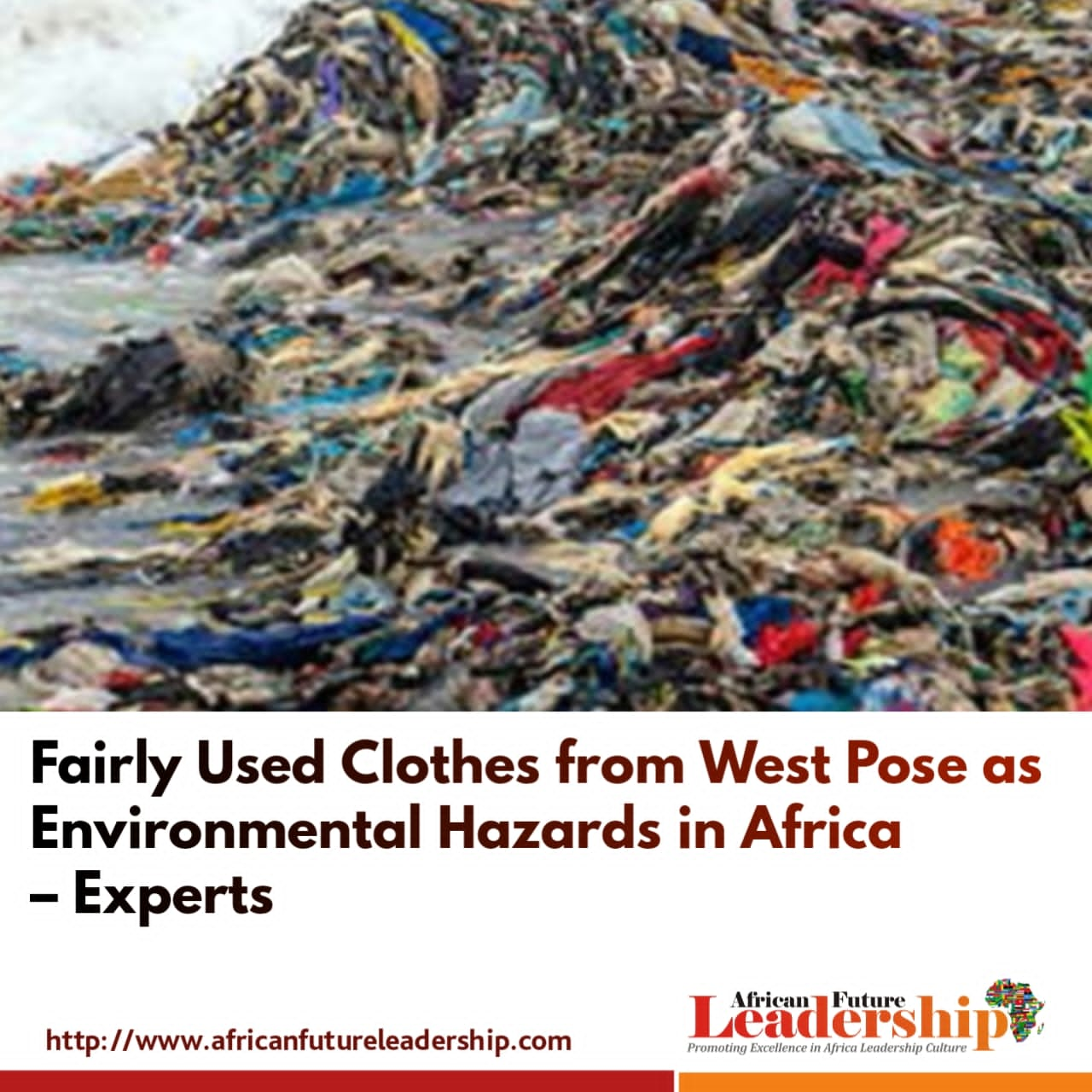Agency News
Non bio-degradable plastic waste and oil are not the only contributors to the worrying global waste problem; clothes are also.
Before now, clothes are worn for decades because of their lasting quality. However, several changes in fashion and the availability of low-cost clothes have increased clothing waste. African countries where most of these used clothes are exported to and sold cheaply are facing huge environmental waste crisis.
According to Bloomberg, the rise in fast fashion has brought about mountains of trash being lodged in most developing countries. It adds that because less than one per cent of used clothing gets recycled into new clothing, castoffs from Europe and America are dumped in most African countries.
An Environmental blog, Treehugger, describes fast fashion as the mass production of cheap, stylish clothes, resulting in significant environmental and labour issues.
Several data undisputedly allude to the fact that developing countries in Africa that are large importers of used clothes face the problem of clothing waste. An international trade data organisation, The Observatory of Economic Complexity, pegged Nigeria as one of the top five importers of used clothing with an annual fee of $124m.
READ MORE: Libya Expels Over 200 Migrants Across its Land Borders
Earth.org reports that 92 million tonnes of textiles waste are produced globally, every year. This implies that a truck full of twaddle clothing ends up on landfill sites every day. Certainly, with the trend at which fast fashion continues, textile waste is expected to soar by 50 per cent by 2030.
But re-use and recycling of already worn garments can help reduce textile waste. Earth.org states that just 12 per cent of materials used in clothing are recycled because of inadequate technologies to recycle them.
The challenge that reuse poses is that most worn clothes from Europe and America and donated to charities are sold at cheap prices in most African countries, consequently, making Africa a dumping ground for used clothes and contributing significantly to the mountain of textile waste.
To this, the United Nations Commodity Trade Statistics Database in 2015 stated that global trade in used clothes witnessed steady growth over the last decade and a half, with global export reaching $4.8bn in 2015.
East Africa was reported to have imported $151m worth of used clothes and shoes from Europe and the United States. A British charity, Oxfam, stated that at least 70 per cent of donated used clothes end up in Africa.
The UN listed the United States of America, the United Kingdom and Germany as the top three exporters of used clothes.
But some East African countries kicked against the increased flow of used clothing and proposed a total ban on it.
In 2019, Rwanda, Tanzania and Uganda decided to raise taxes on second-hand clothes imports as well as offer incentives to their local textile manufacturers. Sadly, only a few countries have implemented the ban, further making Africa saturated with heaps of clothes waste with risk of climate crisis.
Some textile experts and environmentalists have weighed in on the matter.
A professor of Polymer and Textiles at the Ahmadu Bello University, Zaria, Kaduna, Abdulraheem Giwa, stated that reuse and recycling of used clothes should be adopted to reduce clothing waste in the country.
Giwa said, “We can recycle the fibre and fabric. Some of the imported used clothes that are not wearable can be shredded and used as insulators and sand fills. We can turn some of them again into what we call non-woven fabrics like towels, face wipes and so on.
“We need to practise recycling because this will generate employment in several production chains, such as collection, cutting, transportation and finally to recycling companies. This will invariably reduce the environmental impact simply because there is no need for the primary resources to be reused.”
The researcher on polymers, textiles, dyes and solid waste, among others, stated that Nigeria lacks the required knowledge and machinery for recycling, adding that this has presented a low possibility of adopting the strategy.
He, therefore, emphasised that the reuse of clothes through rental and hiring services should be adopted, stating that this would reduce the wardrobe collection of individuals.
He explained, “Presently, there are organisations that rent wedding gowns, invariably this would reduce the number of clothes in one’s collection such that when one has to attend an event, one can go to a rental store, hire a particular outfit and then return it. These clothes will be rewashed, rebagged and made available for another person, who is ready to hire such. Castoffs from the tailoring industry can be shredded and used for insulation in the body of cars and soundproofing.
“Up-recycling means that used clothes can be dyed and or remodelled or restyled to become attractive to other people. Down-cycling means that you are shredding them.”
Also, a specialist in energy, environmental economics and sustainability at the Bayero University, Kano, Faisal Abubakar, agreed that Africa had become a dump site for used clothes that gave the West an easy way to get rid of their cloth waste problem.
He added that most of the imported used clothes were damaged and usually ended up in the landfill.
Abubakar said, “What happens in the West is that when you have something that you don’t use, you are encouraged to donate it to a charity and what the charity does is that they sell off at cheap prices to fund their activities. In doing so, the goods are being bought by traders in Africa at very low prices and when they buy them, they do not know the quality of what they are buying because the clothes are in bundles. Some of the clothes are damaged. It is a very uncertain type of business and it gives the Whites an easy way of getting rid of their waste problem.”
The specialist added that the fashion industry is arguably one of the largest producers of waste and contributes to the climate change crisis. He stated that this was due to the large consumption of water during production.
Abubakar stated that the burden of the end disposal of the clothes was borne by developing countries importing used clothing.
He added, “One other negative thing is that when you are importing such cheap second-hand textiles, it puts local producers under pressure because they will not be able to cope or compete with such goods. It also makes it difficult for our local brands to make clothes that are cheap and can compete with them.
“Ghana suffers the same problem as Nigeria because second-hand goods find their way into the river. Some of the microplastics seen in the ocean, a lot of them come from discarded garments and clothes. They pollute the waters and affect marine life.”
Abubakar called for a ban on the importation of used and worthless clothes to curb the menace.
He added, “The European Union can require the exporter to show evidence that the goods will not be dumped into the landfill or burned as waste. Another thing is public enlightenment. It is difficult to tell traders in second-hand clothing to stop importing but we can make the buyers more aware of the consequences of that import to help them change their opinion about it. Also, encourage people to buy local goods and try to keep them in use for a long time.”
For his part, the Director of Haffar Industrial Co Ltd, a textile industry, Mr Mohammed Haffar, said the major challenge posed by the importation of used clothes was that many of them are unwearable and end up in the landfill.
He alleged that Europe and the far east countries use Nigeria as a dumping ground for their castoffs, adding that this has affected the local textile companies.
Abubakar added that the textile industry, which was once the largest employer of labour in Nigeria, currently has 12-15 textile manufacturers and is faced with the problem of power generation and the impact of smuggled textiles.
The director said, “We run our generators on gas as against diesel to keep our cost lower and to compete in the market but then gas is not always consistent. Many times, we’ve been told by the gas producers that there are production problems and often damage to the gas pipelines and sometimes this goes on for days and weeks.
“We thank the government for helping the textile industry by helping cotton farmers produce Nigerian cotton and helping by giving loans to farmers and this has kept the few remaining textile manufacturers from closing down and laying off thousands of workers, but we need them to ban the importation of Tokunbo clothes into Nigeria.”




